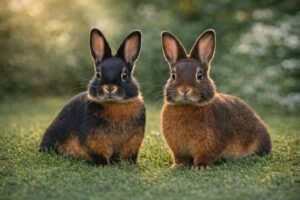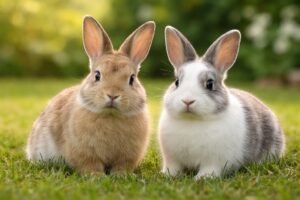If you’re wondering, “Can rabbits eat corn?” you’re not alone. It’s a common question among pet owners. Corn can be tricky; parts of it are safe, but others could harm your rabbit. In this article, we’ll dive into the specifics of a rabbit’s dietary needs, which parts of corn—if any—are rabbit-friendly, and safer alternatives to keep your bunny healthy.
Key Takeaways
- Corn, especially kernels and cobs, is not suitable for rabbits due to digestive risks and a lack of necessary nutrients, while corn husks are acceptable in moderation.
- A rabbit’s diet should consist of mainly hay (approximately 80%), fresh vegetables and greens (about 15%), and a small amount of pellets (5%) to ensure proper nutrition and digestive health.
- Certain foods and treats, including high-sugar fruits, problematic vegetables, and toxic plants, should be avoided to prevent health issues, and any dietary changes should be introduced gradually.
Corn in a Rabbit’s Diet: The Pros and Cons
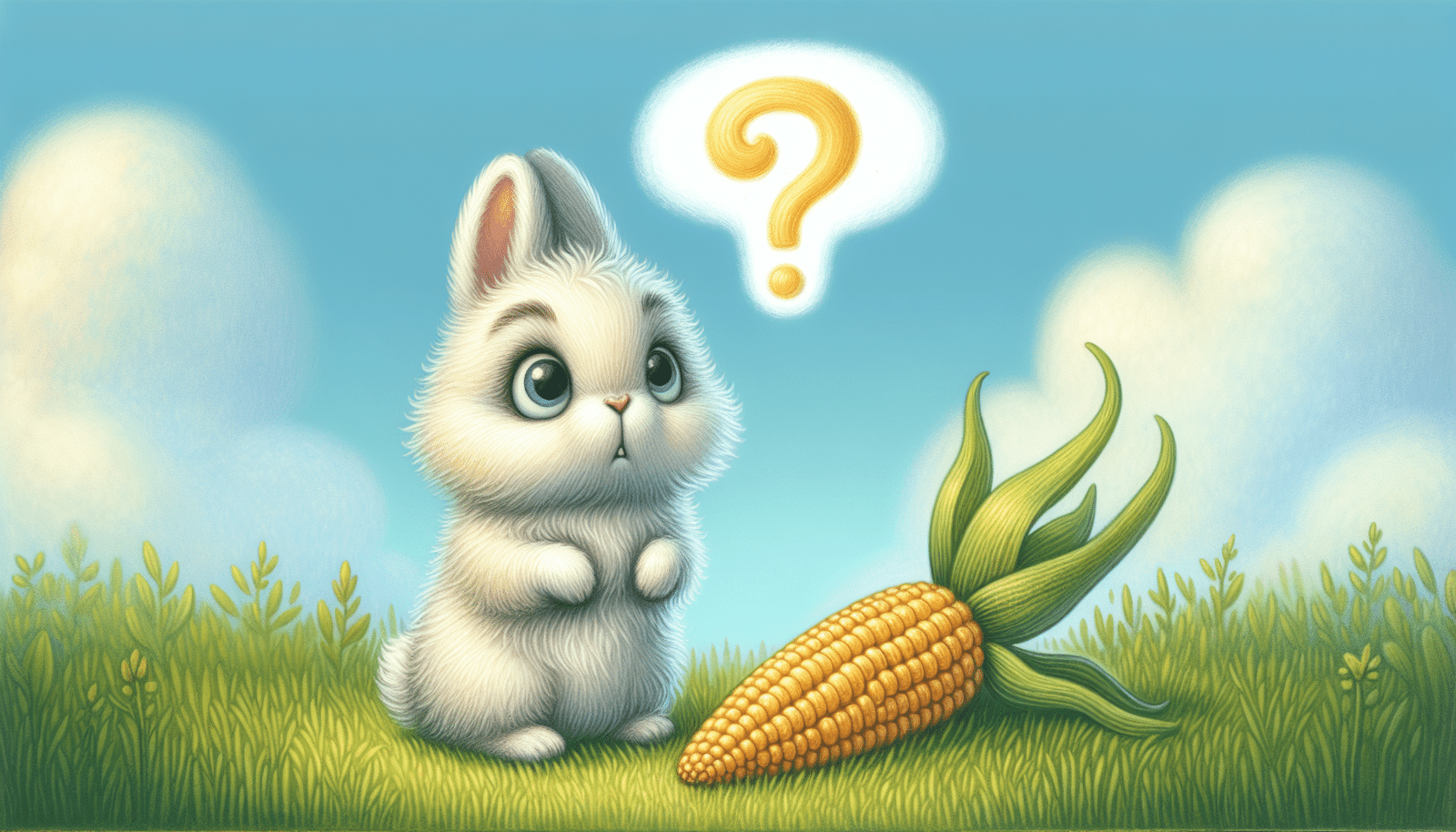
The sight of a rabbit nibbling on a corn husk may seem like an idyllic picture of nature. Indeed, rabbits can eat the husk of the corn plant, as long as it’s organic and untreated. But what happens when bunny eyes land on that golden cob?
The fact is, while corn husks might be on the menu, corn kernels and cobs are a different story. These parts of the corn plant can pose potential digestive risks and should be avoided in a rabbit’s diet. But why is this the case? Let’s peel back the layers and explore.
Nutritional Benefits of Corn
Corn, in its many forms, from sweet corn on the cob to kernels and even popcorn, is a staple in many human diets. This is largely due to its complex carbohydrates which are a source of energy. One popular way to enjoy this nutritious grain is to eat corn directly off the corn cob.
However, when it comes to our fluffy friends, the nutritional benefits of corn are limited. Unlike foods such as carrots or beans, corn doesn’t offer rabbits the nutrients they need in a significant way. While it can be a source of energy, it shouldn’t form a major part of their meals due to potential risks.
Potential Risks and Hazards
So, what are the potential risks of rabbits eating corn? Well, while those kernels might look tempting, they can cause digestive problems, as rabbits’ digestive systems are not suited to process corn effectively. A diet high in corn can lead to digestive issues due to its low fiber content, which contradicts the high-fiber diet required by rabbits. Some potential risks of rabbits eating corn include:
- Digestive problems
- Diarrhea
- Bloating
- Gas
It is best to avoid letting rabbits eat corn and stick to their natural diet of hay, fresh vegetables, and a small amount of pellets.
In fact, forms such as corn kernels and corn on the cob should not be fed to rabbits as they can lead to serious digestive problems, even obesity. So, while corn might be a treat for us humans, it’s best to keep it off the bunny menu.
What Rabbits Should Eat: A Balanced Diet
Having considered the pros and cons of corn in a rabbit’s diet, you may be wondering, “What should a rabbit eat?” The answer lies in the wild. Rabbits have adapted to a diet primarily consisting of grass, which provides the high fiber content they need for a healthy digestive system.
Domestic rabbits should primarily consume hay, making up about 80% of their diet, along with 15% fresh vegetables and greens, and 5% pellets. It’s important to maintain this balance for their nutritional needs. This ensures a balance of fiber, which aids in maintaining intestinal motility and preventing bloat, and a variety of nutrients. Let’s dig deeper into each component of this balanced diet.
Grass Hay
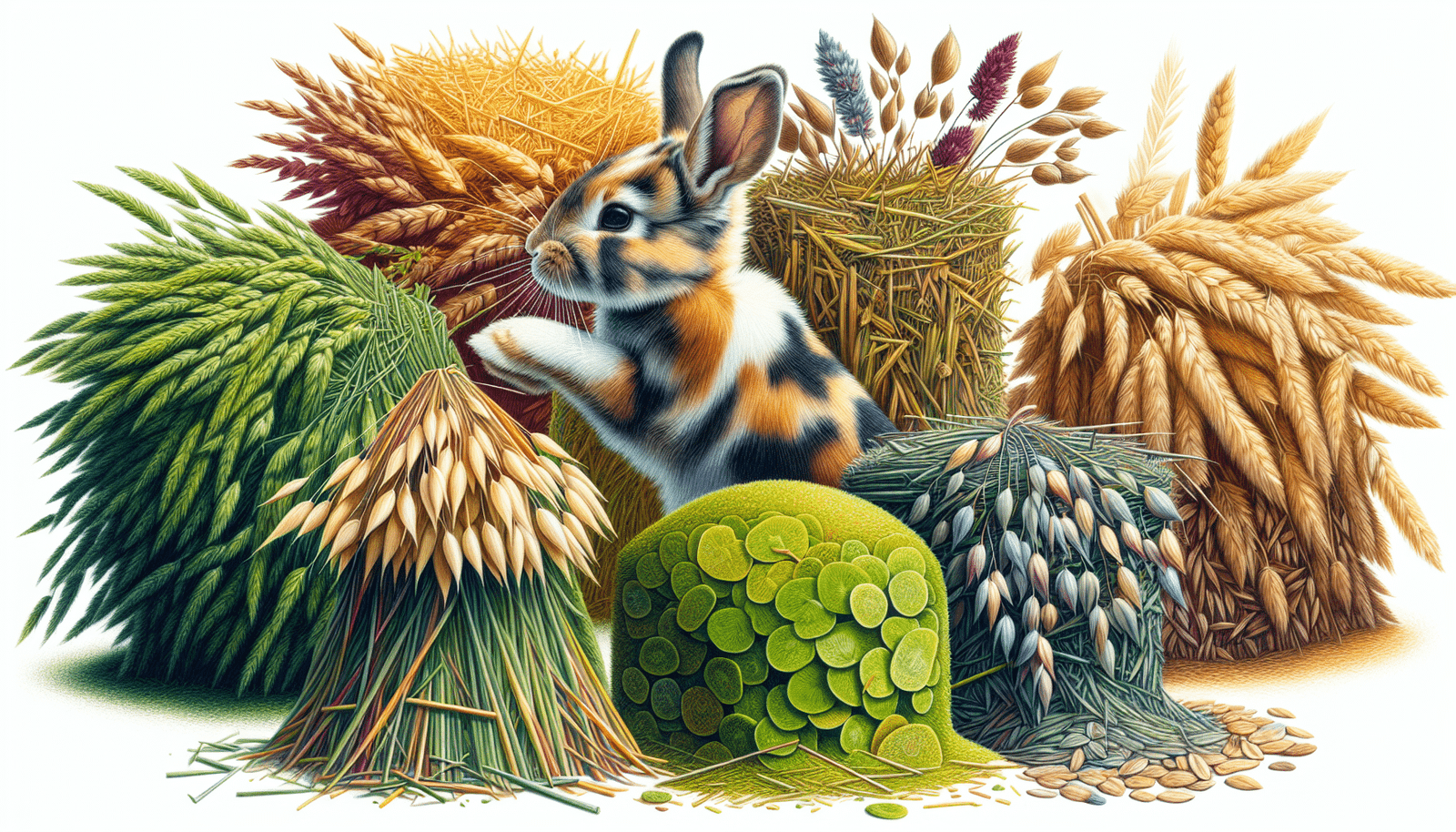
When we talk about a rabbit’s diet, hay is the main event. It should make up to 85% of a rabbit’s diet and be available to them in unlimited quantities. Hay is not just a filler food. It’s packed with fiber, which is vital for maintaining proper digestive health in rabbits.
But it’s not just about digestion. Hay consumption is essential for dental health, as it aids in grinding down rabbits’ constantly growing teeth. Moreover, it encourages rabbits to engage in their natural foraging behaviors, providing mental stimulation.
Suitable types of hay for rabbits include:
- Timothy
- Orchard
- Meadow
- Oat hay
Fresh Vegetables
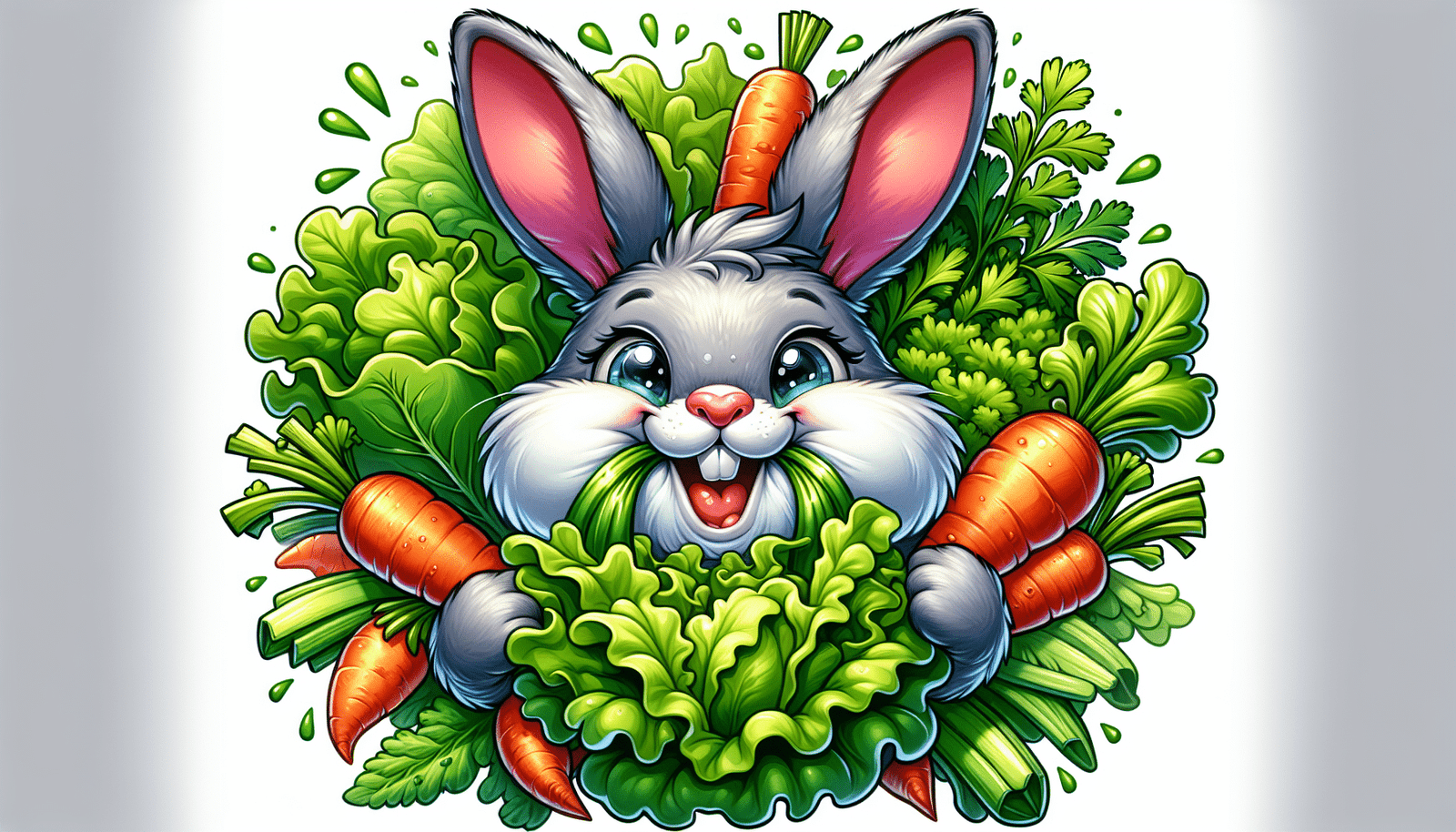
Fresh vegetables are another key component of a rabbit’s diet, making up to 15% of their daily intake. Leafy greens should be the main component of these fresh veggies, constituting approximately 75% of their daily veggie intake.
In addition to leafy greens, rabbits can also have non-leafy vegetables as part of their diet, accounting for about 25% of their daily vegetable consumption. Some fresh, healthy vegetables that your rabbit will love include:
- Carrots
- Bell peppers
- Broccoli
- Brussels sprouts
- Cabbage
- Cauliflower
- Celery
- Cucumber
- Radishes
- Zucchini
So, while corn might not be on the menu, there’s a whole buffet of fresh, healthy vegetables that your rabbit will love.
Pellets and Treats
Now, let’s talk about pellets. While they should only make up a small fraction of a rabbit’s diet, pellets are a concentrated source of nutrients and can play an important role when given in moderation. Just remember, sudden changes in diet can disrupt a rabbit’s digestive system and cause illness, so any changes should be gradual.
When it comes to treats, remember the golden rule of moderation. While it might be tempting to spoil your bunny with all kinds of treats, overdoing it can lead to health issues. By keeping treats as a small, occasional part of their diet, you help ensure your rabbit stays healthy and happy.
Foods to Avoid in a Rabbit’s Diet
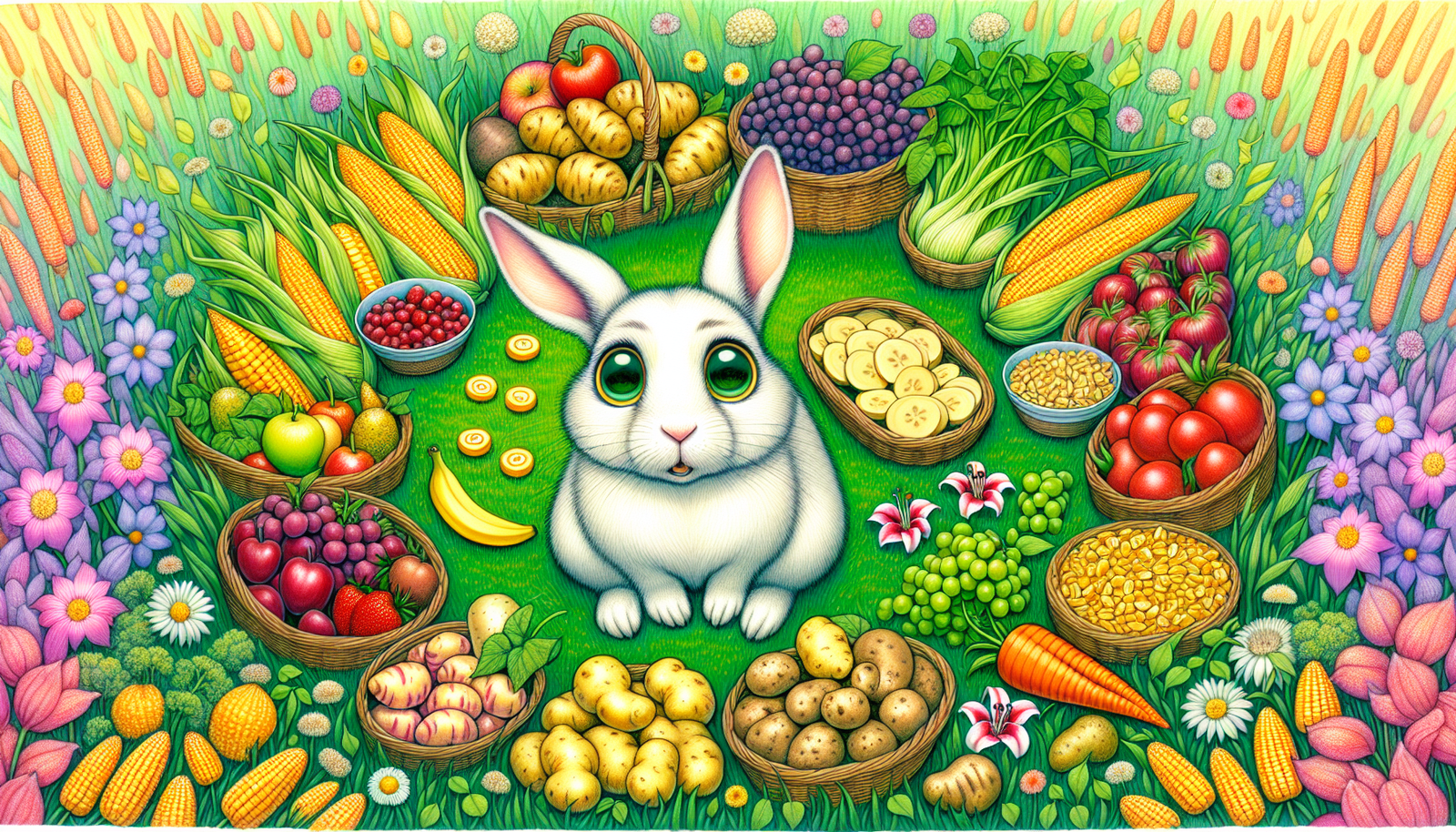
By now, we’ve established that a rabbit’s diet is a finely tuned balance of hay, vegetables, a small amount of pellets, and even smaller amounts of treats. But it’s not just about what rabbits should eat, it’s also about what they should avoid. As we’ve learned, corn, especially kernels and cobs, introduces a high risk of digestive problems to rabbits and is advised against due to the lack of essential nutrients.
But corn is not the only food to be mindful of. There are several other foods that can cause serious health issues for your bunny, including high-sugar fruits, certain vegetables, and even some plants that might seem perfectly harmless to us humans. Let’s take a closer look.
High-Sugar Fruits
While fruits might seem like a healthy treat, it’s important to remember that not all fruits are created equal when it comes to a rabbit’s diet. In particular, high-sugar fruits can lead to digestive issues.
Bananas and grapes, for example, are particularly high in sugar and should only be given to rabbits in very small quantities as infrequent treats. As a rule of thumb, fruit servings for rabbits should be restricted to 1-2 tablespoons per 5 pounds of body weight and offered only once or twice a week due to their high sugar content.
Problematic Vegetables
Just as with fruits, not all vegetables are suitable for rabbits. Certain vegetables may cause health issues and should be avoided. For instance, rabbits should not be fed iceberg lettuce as it contains lactucarium, which can be harmful in large quantities, and offers no nutritional value.
Broccoli should also not be given to rabbits as it can cause painful gas. Similarly, kale and spinach can lead to health issues in rabbits over time due to their high amounts of oxalates and goitrogens. Therefore, moderation and variety are key to preventing health issues from feeding certain vegetables to rabbits, as part of a balanced diet.
Toxic Plants
When it comes to plants, it’s not just about what’s in your rabbit’s food bowl. Rabbits are curious creatures and if allowed access to a garden or outdoor space, they may nibble on plants they come across. However, some plants are toxic to rabbits and should be kept out of their reach.
Common garden plants such as foxgloves, buttercups, ivy, and nightshade are all toxic to rabbits. Other plants, such as onions, leeks, garlic, and rhubarb, as well as common garden flowers like tulips, daffodils, and lilies, are also harmful. Even hay can be dangerous if it contains toxic plants like ragwort. Therefore, it’s essential to ensure that your rabbit’s environment is free of these toxic plants.
Safe Fruit and Vegetable Feeding Practices
We’ve covered what to feed your rabbit and what to avoid, but how about the best practices for feeding fruits and vegetables? Introducing new foods gradually, washing and preparing produce properly, and maintaining appropriate portion sizes and frequency are all critical.
These practices not only ensure your rabbit gets a balanced diet but also prevent potential health issues. Let’s delve into these safe feeding practices in more detail.
Introducing New Foods
Introducing new foods to your rabbit’s diet should be a gradual process. This is because sudden changes can disrupt their digestive system and lead to health issues.
New foods should be introduced one at a time to monitor the rabbit’s response and detect any signs of gastrointestinal distress such as changes in stool consistency. If your rabbit exhibits negative reactions like diarrhea or mushy poop after introducing a new food, you should reduce or remove that food from their diet.
Washing and Preparing Produce
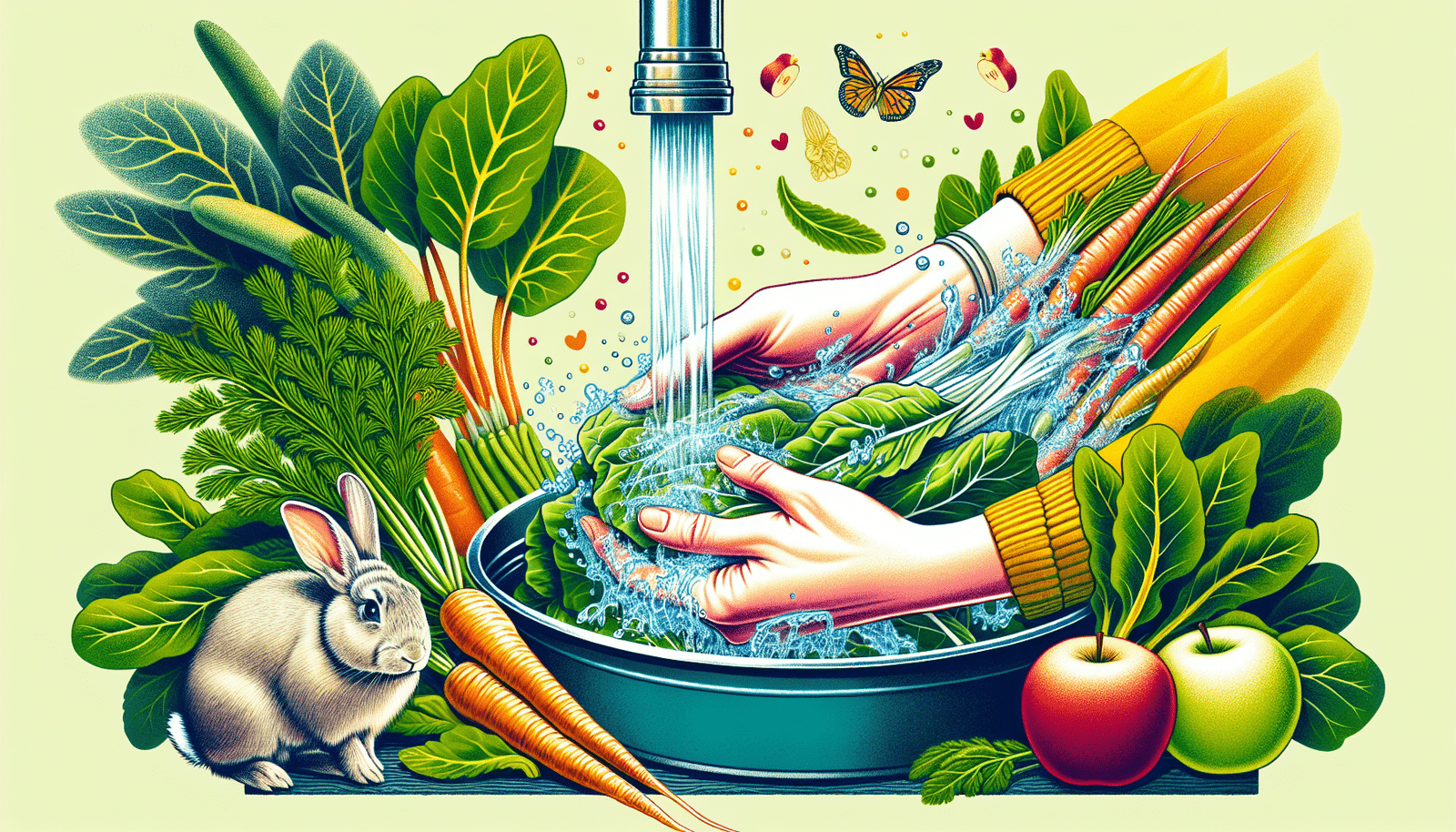
Before you toss that fresh lettuce or carrot into your rabbit’s feeding bowl, it’s important to wash it thoroughly. Fresh produce should be washed or scrubbed thoroughly before being served to rabbits, to remove pesticides and other potential contaminants.
If you can, opt for organic produce to lower the risk of exposure to harmful substances. Even if you’re feeding your rabbit wild foods such as dandelion greens, ensure they are sourced from areas that are not contaminated with pesticides.
Portion Sizes and Frequency
Just as important as what you feed your rabbit is how much and how often you feed it. Here are some guidelines to follow:
- Fruits and vegetables should only make up about 10% of a rabbit’s daily diet
- The remainder of the diet should consist predominantly of hay
- Supplement the hay with a smaller ratio of high-quality rabbit pellets
For a 4-pound rabbit, a suitable measure is 1 to 2 cups of leafy greens, 1 to 2 tablespoons of non-leafy veggies, and a maximum of 1 teaspoon of fruit per day. Adult rabbits shouldn’t consume more than 2 cups of fresh vegetables daily, while smaller breeds under 5 pounds have a limit of 1 cup, with a recommended variety of two to three different vegetables.
Providing Fresh Water for Your Rabbit
Last but far from least on the rabbit care checklist: is water. Rabbits require a substantial amount of water daily, potentially consuming up to 150 milliliters per kilogram of body weight.
While food is vital, water is absolutely essential. Rabbits need constant access to fresh, clean water. And just like their food, there’s a right and wrong way to provide it.
Choosing a Water Dish or Bottle
When it comes to hydrating your bunny, you may wonder whether a dish or a bottle is best. Studies indicate that rabbits may drink more when using a water bowl compared to a bottle, and since they consume similar amounts of water as small dogs, a bowl is a more natural choice for their drinking habits.
However, to prevent spills and contamination, consider a heavy-bottomed ceramic bowl or a bowl firmly attached to their housing. You can also provide both a water bowl and a bottle, allowing your rabbit to choose their preferred drinking method.
Maintaining Clean Water
Whether you choose a dish or bottle, it’s important to keep the water clean. Rabbit water bowls should be changed daily to prevent dehydration and health issues, with the bowls cleaned regularly to avoid the growth of bacteria and algae.
Glass water bottles are preferred over plastic ones for rabbits to avoid potential toxins. They should also be cleaned at least once a week to prevent bacteria buildup. Whether it’s a bowl or a bottle, keeping your rabbit’s water source clean is essential for their health.
Summary
In the end, caring for your bunny’s diet is all about balance, variety, and safety. From the essential grass hay, fresh vegetables, and small amounts of pellets, to the careful introduction of new foods and maintenance of clean water, every aspect plays a part in keeping your rabbit healthy and happy. Remember, while corn husks may be a treat, corn kernels and cobs are best avoided. So, next time you’re preparing your bunny’s meal, you’ll know exactly what to do to ensure they’re hopping healthy.
Frequently Asked Questions
Is ground corn okay for rabbits?
Ground corn is okay for rabbits as long as it’s properly ground or thoroughly chewed for digestibility, as rabbits need a lot of indigestible fiber. However, dried corn cobs should be avoided.
What vegetables can rabbits not eat?
Rabbits should not eat avocado, anything from the onion family, potatoes, sweet potatoes, iceberg lettuce, coffee beans, tea leaves, eggplants, potato leaves, or tomato plant leaves. Be cautious when feeding your rabbit these vegetables.
What should constitute a major part of a rabbit’s diet?
A rabbit’s diet should consist of about 80% good-quality fresh grass and grass hay to ensure proper nutrition and digestive health.
How should new foods be introduced to a rabbit’s diet?
Introduce new foods to your rabbit’s diet one at a time gradually monitor their response and avoid digestive issues.
How often should I clean my rabbit’s water dish or bottle?
You should clean your rabbit’s water bowl daily and their water bottle at least once a week to prevent bacteria buildup. Regular cleaning is essential to maintain your rabbit’s health and hydration.


